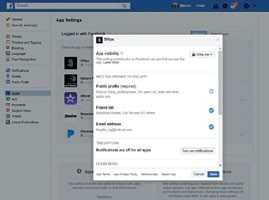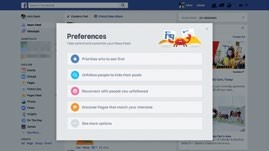We’ve taken for granted that Facebook is all about sharing and fun. But there’s a price to be paid for using it, from becoming a product to advertisers, to losing your privacy, and getting caught in fake news campaigns. Here’s what you should know about LY Hardware using Facebook before you log in again.


We’ve taken for granted that Facebook is all about sharing and fun. But there’s a price to be paid for using it, from becoming a product to advertisers, to losing your privacy, and getting caught in fake news campaigns. Here’s what you should know about LY Hardware using Facebook before you log in again.


Facebook is a great place to connect with friends, stay in touch with family, and get updates on the latest news.
But Facebook is also more than that. Facebook has become a breeding ground for disinformation. Facebook tracks you pervasively, even if you’re not a Facebook user. It plays loose with your data, freely sharing it with third parties.
At the heart of it, Facebook is a surveillance machine designed to turn your personal data into a product. Here’s what you should know about using it.
Facebook as a battleground for the mind
Facebook has become a battleground for disinformation campaigns. It’s likely that foreign agents used Facebook as a propaganda machine in the 2016 US presidential elections. US congressional investigations into the matter are still ongoing.
Malicious actors use Facebook to spread fake news and hate speech. Facebook was forced to shut down temporarily in Sri Lanka, after hate speech on the platform incited mob violence. United Nations investigators have also blamed Facebook for spreading hate speech inciting violence in Myanmar.
Facebook is a pervasive surveillance machine
Facebook tracks your activities online, even when you’ve logged out of Facebook. Facebook even tracks people who aren’t Facebook users. Facebook creates shadow profiles triangulated from users who upload their contacts. Even if you’ve never registered for a Facebook account, it’s likely that Facebook has data on you.
Facebook has so much user data that it’s likely the largest surveillance machine ever built. How many more private corporations know who you are, where you live, where you work, who your friends are, whom you’re with, where you’ve been, and more?
Facebook was careless with users’ personal data.
The Cambridge Analytica scandal shows how Facebook was careless with users’ personal data. In 2014, a researcher named Aleksandr Kogandeveloped a personality quiz app for Facebook. About 270,000 users from the United States installed Kogan’s app and consented to have their personal data harvested.
But the app also amassed the personal data of these users’ friends, none of who consented to do so. As Facebook executives insisted, this wasn’t a security breach. Facebook allowed its third-party developers to scrap friends of friends’ data (it’s since disabled this function). It was Facebook working as intended. But wasn’t allowed was transferring this data to a third party outside Facebook.
But even after Facebook knew that data from nearly 50 million users was harvested and given to a third party, it didn’t inform those users. It asked that the data be deleted, but didn’t confirm that it was.


Facebook turns you into a product
Facebook is not free and it’s never been. You may not have paid a single cent to use the website. But you have been helping Facebook make billions by giving them your personal data to sell to advertisers. At its heart, Facebook is a surveillance machine designed to turn your personal data into a product.
A right to be forgotten
You could delete your Facebook account. But thanks to shadow pro les, your information could still be on the site. Even if you limit the amount of data you share, that doesn’t stop the company from tracking your online activity.
But for all its problems, Facebook still has the potential for good. Millions use the site because it is a great place to connect with friends, stay in touch with family, and get updates on the latest news.
Is there a way to have your cake and eat it too? Unless Facebook changes its business model and stops selling personal data, the answer is “no.” But change may be on the horizon.
The European Union’s General Data Protection Regulation (GDPR) law will come into effect from May. It curtails what companies can do with personal data, like selling people’s information without its consent. It’s very likely this law will affect Facebook, although to what extent remains to be seen.
Governments have been calling for investigations into Facebook following the Cambridge Analytica scandal. This groundswell of anti-Facebook might even lead to regulations on Facebook.
But in the meantime, it’s worth asking you this question. After all that you’ve learned about Facebook, are you’re still okay with using it?
Facebook allowed its third- party developers to scrap friends of friends’ data.
If using Facebook disturbs you, the fastest way to get out is to delete your account. We’ll show you how. But not everyone can stop using Facebook. So we also suggest how to minimize Facebook tracking and quell your use of Facebook.
Delete Facebook
So you’ve decided you want out of Facebook for good? It’s not as straightforward as you might think. The option doesn’t even appear in your account settings. All you get are options to assign the account to someone after you die, and to deactivate your account.
Deactivating your account disables your profile and removes most of what you’ve shared. But some information may still be visible, as you’ll still appear in your friends’ lists. To completely delete your account from Facebook, take the steps that follow.


2. SAVE PHOTOS
There’s no quick way to keep a copy of all the photos you previously posted. You’ll have to go through your albums and right-click to save each one before deleting them.

3. CLEAR LINKED APPS
Next, you’ll want to clear all the apps that use your Facebook account for log in, unless you wish to stop using them too.
• Under settings, click Apps. This will show you all the apps and websites that use your Facebook ID as login credentials.
• Individually change the login to use another email address.
• On each app, click the pencil icon to go to the settings.
• Uncheck everything under “Info you provide to this app” and click “Save.”
• Check the box next to the apps you wish to delete and click “Remove.”
• A pop-up will ask you to confirm the removal of the app. Check “Delete all posts, photos and videos on Facebook that X app may have published on your behalf.” Now, hit the “Remove” button.
• Turn off “Apps, Websites, and Games” by clicking the “Edit” button and clicking “Turn Off .”

4. DELETE ACCOUNT
Now you’re ready to delete your account, but you have to go to a separate page to do so.
• Head to https://www.facebook.com/help/delete_account
• Click the "Delete My Account" button, enter your password, the captcha, and confirm that you want to delete your account.
• Avoid logging into your Facebook account for at least 14 days or your account will be restored.
Minimize Facebook Tracking
Not ready to give up on Facebook yet? We’re not judging. Just remember that every “like” and “share” on a Facebook page is giving away information on you. Here’re some things you can do to keep Facebook’s tracking to a minimum.

1. REMOVE AD PREFERENCES
Click on Settings, and then click the Ads link near the bottom of the list. This brings you to a page titled “Your ad preferences.” You’ll find five expandable banners, with settings that affect the way Facebook sends you ads.
• There’s a whole range of categories under this section ranging from People to Sports and Outdoors to Food and Drink. Be sure to go through each section, mouse over the interest and click to remove.
• Next, move to Advertisers you’ve interacted with and remove every company you don’t wish to receive ads.
• From there, move on to Your Information and turn off all the various categories listed in About you and Your categories.
• Then, go to Ad settings. Change the settings to “Off ”, “No”, and “No One”, then move on to Hide ad topics.

2. ADJUST YOUR APP SETTINGS
We’ve covered this in the section for deleting Facebook, but it’s important to go through this list of apps even if you’re staying. That’s because every app collects different bits of information about you. Uncheck unnecessary things like “Friend list”, “Relationships”, “Work history” etc., then click save.


3. BLOCK THIRD-PARTY COOKIES
For Chrome, go to Settings, Advanced, Content settings, Cookies. This is where you block individual sites from adding cookies. Click add, type “facebook. com” and click add again to block cookies from Facebook.
For Firefox, click the gear icon to access settings and look for Privacy and Security. Choose Never remember history. Then, scroll down to the section Tracking Protection. Under Use Tracking Protection, select “Always”. And do the same for Send websites a “Do Not Track” signal that you don’t want to be tracked.
Mozilla also has a browser extension called the “Facebook container.” It lets you isolate Facebook activity so it’s not shared with external sites. Do note that this doesn’t work if you use your Facebook account to log in to an external website.

4. USE A DIFFERENT BROWSER
For added security, you can also consider using a different browser completely. We’d recommend looking up Epic Privacy Browser and Tor as these focus on privacy. Tor bounces your communications through a network of servers around the world, so no one can trace what you’re surfing.
Unfollow everyone to break your Facebook addiction
This method won’t stop Facebook from tracking you. But it can help you break your addiction to Facebook. Unfollowing everyone turns your News Feed into a blank page. Without anything to see, the urge to check Facebook wanes.

1. UNFOLLOW WITH A LOT OF CLICKING
Facebook doesn’t make it easy to unfollow everyone. Be warned, there is a lot of clicking to follow. In Facebook on the desktop, click on the drop-down menu on the upper right, and then chose ‘News Feed Preferences.’

On the pop-up window that follows, click on Unfollow people to hide their posts. Then click on each one of the friends, pages, and groups you’re following to unfollow them.

This takes a while. Facebook doesn’t show you everything you’re following on a single load. After finishing a batch, click out of the menu, and click back in again to continue unfollowing.

2. CHECK TO SEE YOU’RE FINALLY DONE
You’re done when you use the drop-down menu in the unfollow box, select ‘Friends only,’ ‘Pages only,’ ‘Groups only,’ and find that nothing shows up in any of the options.

3. FACEBOOK MAY STILL BE SHOWING YOU POSTS
Your news feed may still be showing you posts after step 2. If so, go back to the modal window in step 1, select ‘Prioritize who to see first,’ and unfollow everyone there.

4. REACH ‘NEWS FEED ZERO’
That was when you’ll reach ‘News Feed Zero.’ Your news feed will no longer show posts from anyone. The only things it’ll show from then on are you're your most recent posts, and your ‘Facebook memories.’
By Alvin Soon and Marcus Wong Illustration by Mar Kabayan Art Direction by Orland Punzalan Photo 123RF























